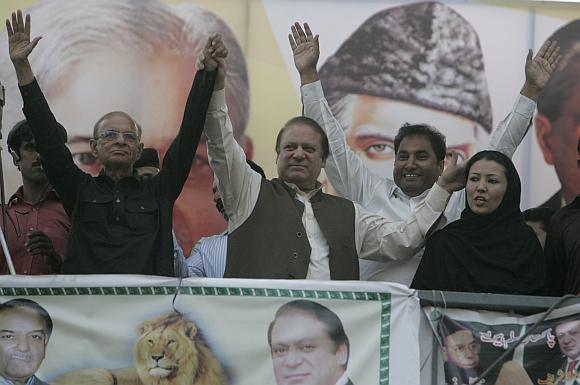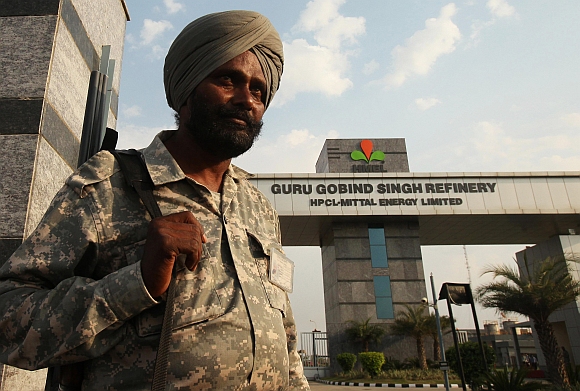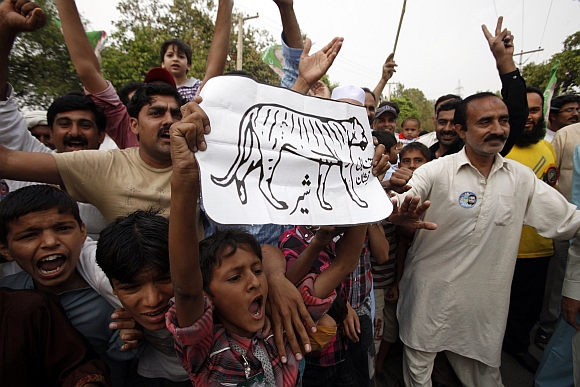Photographs: Mani Rana/Reuters Jyoti Malhotra in New Delhi
Nawaz Sharif's re-election ppens new chances to transform Indo-Pak economic ties, and with this, the rest of the relationship, says Jyoti Malhotra
The victory of the Pakistan Muslim League-Nawaz and its leader, Nawaz Sharif, in the just-concluded elections gives India and Pakistan an opportunity to take up the threads of a very nascent trade and economic partnership begun over the past couple of years.
And, to throw out the historical baggage of suspicion and trust that has calcified over the Pakistani establishment's support for terrorism against Delhi.
Over the next few months, pundits on both sides of the border and the Line of Control will debate the immense challenges Sharif faces to resurrect a country more or less broke, where radical religious sentiments have taken much stronger root since he was in power 14 years ago.
And, where the army and its sister intelligence agency, the Inter-Services Intelligence, will seek control over an Afghanistan from which the United States is withdrawing next year.
In the middle of these exacting circumstances, Sharif can create an oasis of legitimate expectation by seeking stronger trade and economic cooperation with India. If Prime Minister Manmohan Singh lends a helping hand, the latter will not only give the relationship its much-needed push but yet revive his own flagging legacy at home.
...
Pakistan is beset with 18-hour power cuts
Image: A man wears an electricity meter, a bulb and electricity bill around his neck as he takes part in a protest against power cuts in LahorePhotographs: Mohsin Raza/Reuters
Fortunately, several elements are already in place for both Delhi and Islamabad to quickly pick these up and break new ground.
The first is the movement towards trade normalisation, fully phasing out the negative list that Pakistan had promised to do last year, and move towards Most Favoured Nation status.
Once that happens and Pakistan's textile exporters are making enough money out of India to compensate for the fears that Pakistan's basmati-growers (and orange and apple farmers), its automobile parts manufacturers and pharmaceutical companies have about India's greater economies of scale making for cheaper Indian goods flooding the Pak market, the world will surely assume the shape of a oyster for both nations.
It is not well known that the previous Pakistan People's Party government of Asif Ali Zardari had formally asked the World Bank for a $100 million loan to fund the import of 500 Mw of power from India. Pakistan is beset with 18-hour power cuts across the country, especially in Punjab, one very real reason why the PPP has been decimated in these elections.
...
Sharif needs to underline his pro-business image at home
Image: A security personnel stands guard in front of the main entrance of the Guru Gobind Singh oil refinery near Bhatinda in PunjabPhotographs: Ajay Verma/Reuters
If Sharif pushes this project quickly, it can have a dramatic effect in improving bilateral relations. The fact is, both India and Pakistan have already looked at energy cooperation in reducing poverty in both their countries and agencies like the World Bank are willing to push other projects that take this initiative forward.
For example, the ArcelorMittal-Hindustan Petroleum oil refinery in Bhatinda, Punjab, that came on stream last year, is waiting for a stable government inside Pakistan to take forward talks to allow construction of an oil pipeline to the Pak border and, alongside, also sell petroleum goods across the border.
Interestingly, Pakistan's all-powerful army has been on board for more than a year on giving MFN status to India.
On March 19, Pakistan's army, navy and air force chiefs, as well as other members of the powerful armed forces establishment, asked for a briefing from their commerce secretary, to explain in greater detail the implications of opening up.
According to reports, they were told that trade normalisation would lead to greater employment, large revenues currently lost to smuggling and trade via third countries, a greater variety to consumers, as well as cheaper goods.
...
Sharif has a tough menu
Image: A boy holds up a picture of a tiger, the election symbol of the PML-N, as the party's supporters celebrate after the results of the general election in LahorePhotographs: Mohsin Raza/Reuters
Simultaneously, if India can lift the ban on Indian investment into Pakistan, this will enormously strengthen Sharif's hands and underline his pro-business image at home. In turn, this will help him push through visas for businesspeople, as well as ordinary citizens. This had been finalised in late 2012 but has since faltered at the hands of recent incidents (like the beheading of the Indian soldier on the border in January).
In a January conversation with Sharif, it seemed clear he had learnt the lessons of 1999, when his then army chief, Pervez Musharraf, overthrew him and then went on to persecute Sharif.
At the time, the people of Pakistan had welcomed the removal of a corrupt government -- with the same enthusiasm with which they have now voted Nawaz back to power.
The message is clear -- the people of Pakistan want governance, stability, an end to needless estrangement with India, as well as the taming of the country's all-powerful army and ISI.
Sharif has a tough menu. He would do well to consolidate his assets and quickly move forward on the economic front. If he finds India is ready and willing to lend a helping hand, transformation of the sub-continent could well move into a new dawn.





article